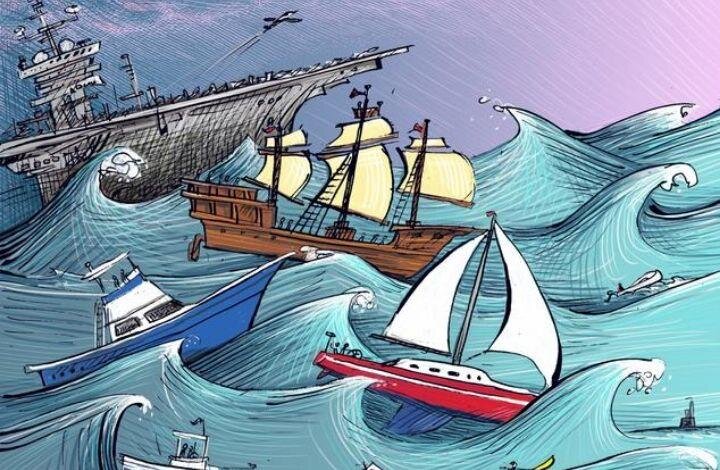World Mental Health Day
All in the same storm, not in the same boat
For some time we’ve only seen images of others’ homes, local walks and dinner plates at the dinner table. There was a strange comfort in our isolation and that of others; life in our own little castle, learning new skills in DIY, baking bread or whizzing up homemade soup. Life has begun to change and many seem to be back to normality. Friends are reunited, the walks have become hikes and the dinner plate is not on a table you recognise. But the impact on those less fortunate is unimaginable. And even for those lucky enough to have maintained their homelife and health, an unexpected inequality has developed for those who still need to shield, or who get identified as a close contact without notice, or whose home country remains “on the red list,” with family well overdue a visit. Considering the impact of the pandemic, it seems clear that we were all in the same storm, but not in the same boat.
For submariners, the ocean is a great leveller (regardless of sea state). In the same uniform, with the same training, common risk awareness and focussed drive, we operate as one unit: whether above or below the waves. It is our partners, friends and families who have placed their lives on hold, smiled as a singleton at the event flooded with couples, and struggled to be supported by those with no experience of life with a partner at sea. The pandemic has intensified the difficulties that our families have dealt with for 120 years and the impact has been significant. This is an incredible achievement and one that allows us to keep doing our jobs at sea.
Mental health in an unequal world, the subject of this year's World Mental Health Day, will rightly see a drive to support those in need whose lives are less fortunate. It's important to raise awareness, deliver support and end the stigma around mental health. And whilst solving a problem for someone else will often deliver a solution closer to home, it's important that we consider today's subject in our own lives. The Royal Navy already delivers incredible support but it’s fantastic to see the plethora of resources on the Mental Health Foundation website and their take on how the nation has ridden the waves of the last few years.
Just as mindfulness will teach you to step back and accept your situation, do you understand your own inequality, no matter how small, and how this impacts your life? Do others see it and support you? Do they know if you’ve been sailing in a super yacht or a lowly dinghy? Do you know how to support yourself? It’s odd to admit, but as submariners our isolated life at sea can be a sweet taste of the positives of lock down: The focus on self, building bonds with a close few, establishing a routine and finding headspace where physically there is none. Perhaps now we realise the benefit of a few extra sea days. Equally, the nation has probably now felt the agoraphobic anxiety of a return to face to face, that same feeling we face each time we return home from sea. Successfully dealing with that stress builds resilience and it’s important to talk about how this was managed. A new skill here gives confidence to deal with the next stressor, and knowing that should be a real positive.
We are not all the same. Inequality affects us all and your mental health must be managed, but take strength in getting this far. There’s a parallel between our ocean rowing boat OARDACIOUS, the submarines we’ve served in, and our lockdown locations: Our mind was with us the whole time and that headspace is always going to be there; to retreat to, batten down the hatches, take stock and be able to return to our busy lives: so look after it! Looking back at the worst of the pandemic, whether you got through on a kayak or an ocean liner, just be proud that you did, and hope for fair weather ahead.

